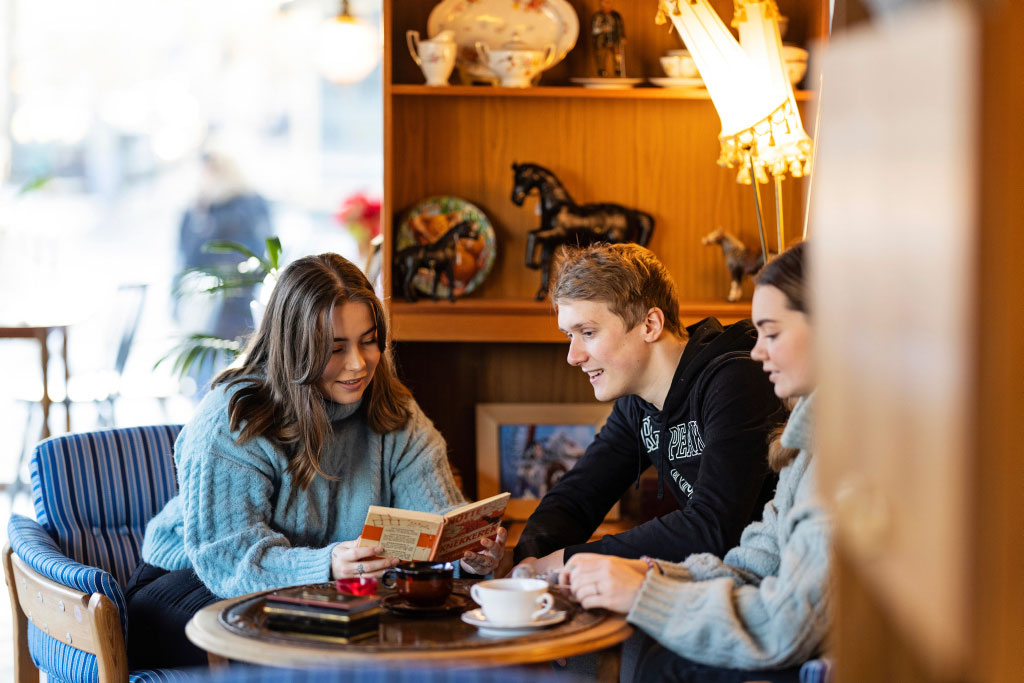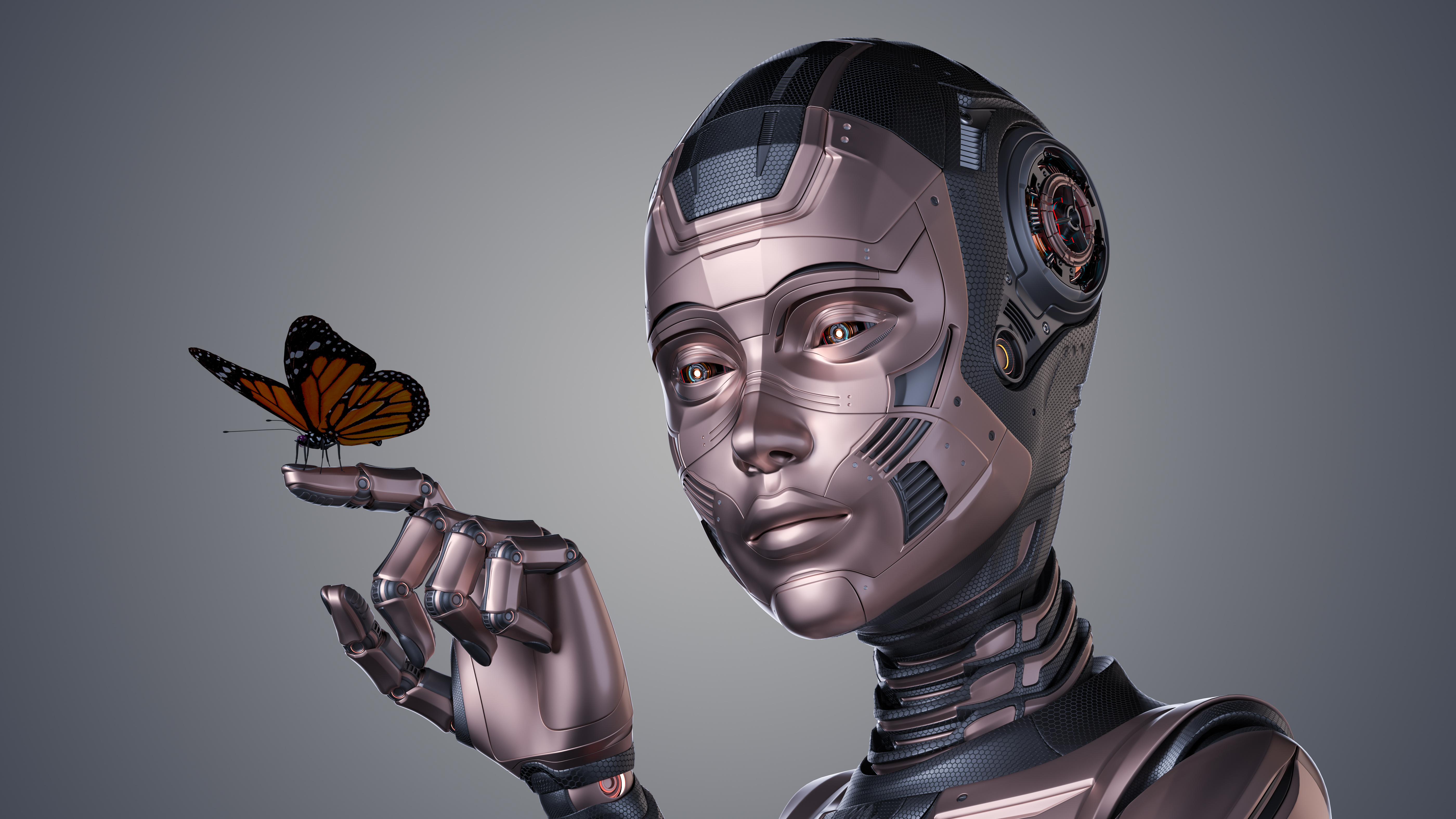DigiKULT
DigiKULT: Digitalization and AI in society
The research group focuses on the emergence of digital technology and social robots, and the new cultural practices this brings to society.
Current Projects
AImagine: Artificial Imaginaries of the Socio-Technical
AImagine: Artificial Imaginaries of the Socio-Technical
Artificial Imaginaries of the Socio-Technical (AImagine)
AImagine enhances DigiKULT’s focus on digitalization as societal inquiry related to fictional imaginaries of technology. It investigates how fictional depictions of AI/robots lay the groundwork for the development and domestication of actual technology, and how they negotiate current issues of increased reliance on and use of technology in everyday practices. AI and robots are also capturing our imagination like never before, and we need more knowledge on how imaginaries relate to real life application.
Project leader: Roger A. Søraa (NTNU)
Contact person: Roger A. Søraa (NTNU)
Funding: NTNU Humanities Faculty
Duration: 2023-2027
AUTOWORK: Workers in transition through automation, digitalization and robotization of work
AUTOWORK: Workers in transition through automation, digitalization and robotization of work
How are new technologies of automation changing work-life? We are now at a point in time when digital technologies are changing societies and work-life. Increasingly advanced, complex, and intelligent machines prove capable of performing work previously mastered by humans alone. The effects and implications of this for both individual workers and society are not yet known. AUTOWORK, an exciting collaboration between NTNU Norwegian University of Science and Technology and Monash University in Australia, will explore this transformation across three sectors poised to be particularly impacted by automation: Building, Sale, and Healthcare.
Project leader: Håkon Fyhn (NTNU)
Contact persons: Roger A. Søraa (NTNU); Mark Kharas (NTNU)
Funding: The Research Council of Norway
Duration: 2019-2024
BIAS: Mitigating diversity biases in the labor market
BIAS: Mitigating diversity biases in the labor market
The project will investigate the use of Artificial Intelligence in the labor market, and how biases in hiring and promoting processes based on personal characteristics are potentially reproduced with AI-based systems.In an employment context, this can for example involve analyzing text created by an employee or recruitment candidate in order to assist management in deciding to invite a candidate for an interview, to training and employee engagement, or to monitor for infractions that could lead to disciplinary proceedings. It is therefore necessary to identify and mitigate biases that occur in applications used in a Human Resources Management (HRM) context.
The project will (1) investigate this from a technical perspective by identifying how current AI systems are biased and propose solutions to make them less biased, and (2) from a social scientific side with extensive ethnographic fieldwork concerning the lived experiences of employees, Human Resource managers, and technology developers. The project will then (3) provide substantial training for HR managers and technology developers regarding the responsible development and implementation of AI.
Project leader: Roger A. Søraa (NTNU)
Contact persons: Roger A. Søraa (NTNU); Mark Kharas (NTNU)
Funding: Horizon Europe (RIA)
Duration: 2022-2026
DigiFrailCare
DigiFrailCare
DigiFrailCare targets digitisation and the use of digitised health data to improve health services for older people at risk of or with frailty. Frailty refers to age-related physical debility; a complex condition characterised by a cumulative decline across multiple physiological systems and increasing vulnerability to adverse health outcomes and death. Sustainable health services for frail older people are highly needed. The project will impact future multidisciplinary work models for frailty to improve health and function in older people, for the sake of improved and sustainable future health care services.
Project leader: Roger A. Søraa (NTNU)
Funding: Faculty of Medicine and Health Sciences (NTNU)
Contact: Roger A. Søraa (NTNU)
Duration: 2023-2027
DIGIT: Norwegian Research School on Digitalization, Culture and Society
DIGIT: Norwegian Research School on Digitalization, Culture and Society
The Norwegian Research School on Digitalization, Culture and Society (DIGIT) offers joint seminars, academic courses, writing workshops, communication and management training, network- and secondment opportunities, providing PhD students and postdoctoral fellows with a platform to conduct innovative investigations into the complex interplay of digital, cultural and social changes.
Project leader: Roger A. Søraa (NTNU)
Research partner: OsloMet
Contact person: Roger A. Søraa (NTNU)
Funding: OsloMet
Duration: 2022-2029
Horny for Ghost: The collective mediation of sexual desire and "TikTok'ifaction" of fandom
Horny for Ghost: The collective mediation of sexual desire and "TikTok'ifaction" of fandom
Horny for Ghost: The collective mediation of sexual desire and "TikTok'ifaction" of fandom investigates a) how emotion (specifically sexual desire) is mediated and circulated on TikTok, b) how the material affordances of the platform are shaping creativity and community online, and c) how TikTok is changing, and continuing, established fan practices and -expressions.
Contact person: Kristine Ask
SoMaT: Sociomaterial transformations in Norway and East Asia
SoMaT: Sociomaterial transformations in Norway and East Asia
This INTPART project investigates sociomaterial transformations in Norway and East Asia from a Humanities-based Science & Technology Studies (STS) framework on three thematic areas: sustainability, digitalization, and diversity.
Project leaders: Roger Søraa (NTNU); Marius Korsnes (NTNU)
Funding: The Research Council of Norway
Duration: 2023-2028
Completed projects
Caring Futures: Developing Care Ethics for Technology-Mediated Care Practices
Caring Futures: Developing Care Ethics for Technology-Mediated Care Practices
The research project Caring Futures: Developing Care Ethics for Technology-Mediated Care Practices sought to further develop care ethics in an increasingly technological health and welfare sector. The project revisits care ethics in practice- and experience-near contexts, at a time of changing health, care, and welfare policies, services, and practices. Our principal research question is: how can technology-mediated care practices become care-ethically sound – and, correspondingly, how can care ethics become more technology-aware?
Project leader: Professor Ellen Ramvi (UiS)
Contact person: Roger A. Søraa (NTNU)
Funding: The Research Council of Norway
Duration: 2020-2024
External site for Caring Futures
Instagram; Twitter handle: @UisQualitech
eWare: Early Warning Accompanies Robotics Excellence
eWare: Early Warning Accompanies Robotics Excellence
The project focuses on improving the life of people with dementia and their caregivers. eWare aims to develop a useful and meaningful service in co-design with human beings. The main project goals of eWare are focused on reducing stress of the informal carers and the patient community, enhancing quality of life of the informal carer and person with dementia, and supporting communication and information between formal and informal carers. Lifestyle monitoring e.g. through sensors, can reduce caregiver’s distress and thereby extend the period that the informal caregiver can sustain the care and support needs for the person with dementia with active return in terms of patient life quality and social costs. KULT participates through a sociotechnical analysis of robots used in the project.
Funding source: eWare is fundingd by EU H2020 AAL (2017-2020).
Contact: Roger A. Søraa & Jon Sørgård
DRIVERS: Digitalization of the Road Sector and the Role of Driving
DRIVERS: Digitalization of the Road Sector and the Role of Driving
The primary goal of DRIVERS is to investigate how a digitized and automated transport sector affects drivers, driving behavior and practices. One of the work packages aims at developing dimensions of Responsible Research and Innovation (RRI) in practice while working to build socially robust knowledge about automated vehicles. The WP explores possible impacts and implications that may otherwise remain uncovered and serve as an entry point for reflecting on underlying purposes, motivations, what is known and unknown; risks, assumptions and dilemmas. The project involves a strong network of international scholars as well as key actors in the digitalization and automation of the Norwegian transport sector, such as Norwegian Public Roads Administration (NPRA), the Norwegian Road Transport Association (NRTA), the Norwegian Automobile Association (NAF), Kolumbus, Forus Næringspark, AtB, NITO, Stavanger municipality). The project is led by NTNU KULT.
Funding: Research Council Norway Transport 2025 (2019-2023)
Contact: Tomas Moe Skjølsvold
GAME: Gamer Parents Mediating Play
GAME: Gamer Parents Mediating Play
How do gamer parents regulate player practices in their children? This study investigates parents who are gamers to better understand how game literacy shape mediations of play, and how they approach, negotiate and control their childrens player habits. Studies of gamers show that conflicts between parents and children are frequent and parents lack of experience with games are frequently a source of issues. What happens when the parents are expert gamers?
Based on qualitative interviews with norwegian gamer parents we use domestication theory to analyse negotioations surrounding games. Some questions we will explore are: What knowledge and sources do gamer parents base their mediation on? What do they consider risky behaviour in games? What strategies do they use to regular player behaviour in their children and themselves?
Funding: Spillforsk
Contact: Kristine Ask
LIFEBOTS Exchange: Creating a new reality of care and welfare through the inclusion of social robots
LIFEBOTS Exchange: Creating a new reality of care and welfare through the inclusion of social robots
Are robots ready for society, and is society ready for robots? The aim of this project was to foster cross-sectoral, international and interdisciplinary collaboration to advance social robotics. The project focused on the health domain, investigating how social robots can be included in people’s lives. By closing the design-development-experiment cycle embedded in a multidisciplinary and multi-sectoral context, the project aimed to foster sociotechnical human-robot relations relevant for robotic inclusiveness. The LIFEBOTS project built a knowledge hub for social robotics research and development through staff exchange. The project’s three main goals were to: 1. Enhance the competencies of involved staff members with knowledge from different disciplines, refining and focusing their skills, while developing their knowledge beyond their current sector. 2. Build a tri-sectoral network involving academia, industry and users of technology such that all stakeholders can benefit from the knowledge of the others. 3. Create an enduring network that will outlive the funding of the grant committed to regularly promote staff exchange and the coordination of high-end dissemination with cross-sectoral and multidisciplinary activities in order to attract new staff for their organizations, share knowledge and give visibility to members outside the network. KULT participated with mutual research staff exchange, primarily with the STS evironment in KAIST, South Korea.
Project leader: Artur Serrano (NTNU)
Contact person: Roger A. Søraa (NTNU)
Funding: Research and Innovation Staff Exchange (RISE)
Duration: 2019-2025
LIFEBOTS-Exchange-Extended (LEE)
LIFEBOTS-Exchange-Extended (LEE)
The LIFEBOTS-Exchange-Extended (LEE) project brought together Norwegian companies and public organizations with academic experts to envision the future of robotics in the healthcare sector and expand the impact and reach of LIFEBOT Exchange.
Project leader: Artur Serrano (NTNU)
Contact person: Roger A. Søraa (NTNU); Mark Kharas (NTNU); Yu Cheng (NTNU)
Funding: The Research Council of Norway
Duration: 2019-2023
LIM: Language, Integration and Media
LIM: Language, Integration and Media
The project aim to develop new and engaging ways of learning for Norwegian High School students and young migrants to improve academic performance and encourage integration. The Work Package DigiTac is located at KULT and investigates the role and potential of digital technology to create and support learning and integration in the classroom. DigiTac will develop course material about multimodal storytelling (digital storytelling) as part of the We Are All Migrants course, and analyse how the course uses digital technology.
The project’s multidisciplinary team are from NTNU’s Dept. of Language and Literature, Teacher Education, Interdisciplinary Studies of Culture and Education and Lifelong Learning. In addition the project cooperates with teachers and students about development, piloting and execution of the WAAM course. See https://www.ntnu.edu/web/isl/lim for more info
Funding: The Research Council of Norway FINNUT
Contact: Kristine Ask
My Robot Friend
My Robot Friend
My Robot Friend studies how social robots can become part of the daily lives of elderly people in their own homes, how robots can be a social resource for the elderly, and act as an intermediary between people who want to live at home, their relatives, and municipal actors. The project examines the expectations of robots as future mechanical helpers. It explores the potential of assistive technology, and how robots can supplement, but not replace, human contact in care. Our hypothesis is that robots can lead to more autonomy for the individual. This is a collaborative project between NTNU Trondheim, NTNU Ålesund, ALV-Møre og Romsdal & Development Center for nursing homes and home services in Møre og Romsdal. The project is lead by NTNU KULT.
Funding: Helsemyndighetene / InnoMed (2018-2020).
Contact: Roger A. Søraa
ROBOCARE: Robotic Care. Networks of health, technology and culture
ROBOCARE: Robotic Care. Networks of health, technology and culture
Robotics4EU
Robotics4EU
Robotics4EU sought to create and empower the EU-wide responsible robotics community representing robotics innovators from companies and academia in the four application areas, as well as citizens/users and policy/decision-makers by: (1) raising awareness about non-technological aspects of robotics by organizing community building and co-creation events bringing together the robotics community and citizens; (2) advocating for the responsible robotics among all stakeholders groups; (3) developing a responsible robotics maturity assessment model and bringing the project results to the standardization bodies. KULT was a project partner leading the healthcare and Societal Readiness part of the project.
Project leader: CIVITTA
Contact person: Roger A. Søraa (NTNU)
Funding: Horizon 2020 (Research and Innovation programme)
Duration: 2020-2023
SmaT: Smart technology for sustainable agriculture
SmaT: Smart technology for sustainable agriculture
The project looks at robotisation of agriculture. Changed market conditions, socio-economic factors and established practices affect how new technologies are used in agriculture. The aim of the SmaT project is to contribute to the development, adaptation and implementation of new sustainable technology in Norwegian agriculture in a sustainable manner. Examples are robot and drone technology, digitization, sensor technology, electrification, precision agriculture, etc. We will map ongoing technology development projects to assess the technology's maturity, examine how the technologies affect social and structural conditions in agriculture, and study market development and market opportunities for new technologies. SmaT also includes an innovation effort to actively develop and promote concrete technology development projects and business start-ups. The project is a collaboration between Ruralis - Department of Rural and Regional Research Felleskjøpet Agri, Norwegian Agricultural Cooperation, Mære agricultureskole, and Agriculture21 Trøndelag. KULT participates through a domestication analysis of No-Fence technology & a technology-historical analysis of the roundball-press among others.
Funding source: Research Council Norway, Forskningsmidlene for jordbruk og matindustri (2019-2023)
Contact: Terje Finstad
VELTEK: Posthuman perspectives on Welfare Technology
VELTEK: Posthuman perspectives on Welfare Technology
Group leaders
Group members
-
Leika Aruga PhD Candidate
+47-73559727 leika.r.aruga@ntnu.no Department of Interdisciplinary Studies of Culture -
Margrethe Aune Professor
+47-73591898 +4791897593 margrethe.aune@ntnu.no Department of Interdisciplinary Studies of Culture -
Thomas Berker Professor
+47-73591326 thomas.berker@ntnu.no Department of Interdisciplinary Studies of Culture -
Silvia Ecclesia PhD Candidate
+47-73559278 silvia.ecclesia@ntnu.no Department of Interdisciplinary Studies of Culture -
Jin Kristian Hurum PhD Candidate
+47-73412287 jin.k.hurum@ntnu.no Department of Interdisciplinary Studies of Culture -
Mark William Kharas Senior EU Advisor
+47-73598527 mark.w.kharas@ntnu.no Department of Interdisciplinary Studies of Culture -
Margaret Lefstad PhD Candidate
+47-+4773412213 margaret.lefstad@ntnu.no Department of Interdisciplinary Studies of Culture -
Aud Uhlen Obstfelder Professor
+47-61135411 +4795246791 aud.obstfelder@ntnu.no Centre for Care Research -
Kyriaki Papageorgiou Marie Skłodowska-Curie Fellow & Senior Researcher
kyriaki.papageorgiou@ntnu.no Department of Interdisciplinary Studies of Culture -
Frida Englund Sandvik Research Assistant
frida.e.sandvik@ntnu.no Department of Interdisciplinary Studies of Culture -
Shan Wang PhD Candidate
+47-73412931 shan.wang@ntnu.no Department of Interdisciplinary Studies of Culture



